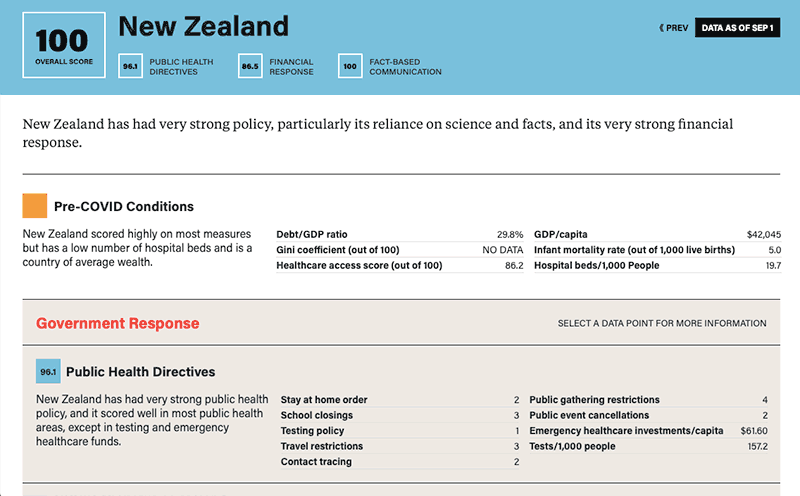Travel and tourism will be changed forever. We asked seven leading thinkers for their predictions.
- 28.7 Public Health
Directives - 17.5 Financial
Response - 88 Fact-Based
Communication
Switzerland's reliance on facts and an open media drove its score up to the median, helping to counter weak financial support and limited restrictions on social interactions.
Pre-COVID Conditions
Despite high scores in almost every subcategory, Switzerland’s low number of hospital beds lowered its pre-pandemic conditions score.
- Debt/GDP ratio 40.5%
- GDP/capita $67,558
- Gini coefficient (out of 100) 32.7
- Infant mortality rate (out of 1,000 live births) 4
- Healthcare access score (out of 100) 91.8
- Hospital beds/1,000 People 33.6
Government Response
Select a data point for more information(Data points represent policy level as of Sep 1.)
Public Health Directives
Switzerland’s public health policy is relatively weak, driven down primarily by limited stay-at-home orders and low levels of testing and emergency healthcare funds.
- Stay at home order 0
- Public gathering restrictions 3
- School closings 0
- Public event cancellations 2
- Testing policy 0
- Emergency healthcare investments/capita $311.97
- Travel restrictions 3
- Tests/1,000 people 117
- Contact tracing 2
Financial Response
Switzerland’s financial response was relatively weak, particularly due to poor debt support.
- Financial stimulus as share of GDP 10.4%
- Income support 2
- Debt forebearance 0
Fact-Based Communication
Switzerland has largely not engaged in misinformation nor limited press freedom in response to COVID-19.
- Reliance on science/fact based information 1
- Press freedom 0
COVID-19 Status as of Sep 1
Switzerland’s strong pre-pandemic conditions likely helped keep its death rate fairly low, and its low positivity score means it is likely diagnosing a wide range of its populace, resulting in a relatively strong performance in this category.
- Total deaths 1,725
- Death rate per 100K 199.3
- Total cases 42,069
- Cases per 100K 4,861
- Percent of positive tests 2.8
- Change in positivity rates +0.1
| Date | Status | New Cases/1M | |
|---|---|---|---|
| 1 | Apr 27 | Medical practices, dental practices, and hair salons reopen | 21.79 |
| 2 | May 11 | Primary and secondary schools, shops and markets, travel agencies, museums, libraries, restaurants, bars, and pubs reopen; exams at educational institutions and some sporting events are allowed; border restrictions are loosened | 6.60 |
| 3 | May 28 | Religious services are allowed | 1.70 |
| 4 | Jun 06 | Events with up to 300 people are permitted | 1.78 |
| 5 | Jun 22 | Events with up to 1,000 people are allowed | 2.89 |
Differentiating Factors
- Swiss economy enters recession: The pandemic has triggered Switzerland's worst quarterly downturn in 40 years, the government has announced, with the service and tourism sector seeing a 54.2 percent drop in output. However, economists are confident that recovery will be swift, returning the economy to pre-crisis levels by the end of 2021. Read More
- Major healthcare investment produced surplus supplies: The Swiss federal government facilitated a centralized purchase of medical equipment and PPE that was then distributed to cantons on the basis of need, following concerns that the healthcare system could collapse. Having authorized the use of $2.66 billion, the country now finds itself with a surplus of ventilators and other equipment. Read More
- Military assisting coronavirus response: Switzerland mobilized 8,000 military members to assist civil authorities and medical personnel with their coronavirus response, including enforcing a strict emergency lockdown. Read More
- Very late mask mandate: Despite re-opening the economy in mid-May, including allowing indoor restaurant dining, Switzerland waited until July to make masks mandatory on public transport. This is a comparatively late decision compared to other countries opening their economies. Read More
Compared with EU Neighbors
-
28.5Turkey 270,133
Cases 3,203
Per 1M 6,370
DeathsTurkey has very weak policy, driven by little emergency spending, stimulus, or debt relief, and loosening restrictions. It also has limited press freedom and has conducted minimal testing.
-
59.5Norway 10,644
Cases 1,963
Per 1M 264
DeathsNorway scores just below the median, pulled down by its weak public health and financial response scores, despite a strong reliance on facts and a free press.
-
47.6Russia 995,319
Cases 6,820
Per 1M 17,176
DeathsRussia has a relatively weak score, with strong public health policy undone by weak financial support, limitations on press freedom, and spread of misinformation about the pandemic.
Further Reading From Foreign Policy
Be the source of actionable insight.
Select one of the subscription options below to read the full Covid-19 Global Response Index. Unlock even more global intelligence with a subscription to FP Insider.
Already an FP Insider? Log In
Looking for group access? Contact us directly

Statistics and government response factors available on each country profile include:
Pre-COVID Conditions:
- Debt to GDP ratio
- Infant mortality rates
- Hospital beds per 1,000 people
- Gini coefficients measuring inequality
- Health access and quality
COVID-19 Public Health Directives:
- Stay-at home orders
- School-closing policy
- Public-gathering restrictions
- Cancellation of public events
- Testing policy and rates per 1,000 people
- Emergency healthcare spending per capita
- Travel restrictions
- Contact tracing
COVID-19 Financial Response:
- Stimulus package as a share of GDP
- Income support
- Debt-forbearance
Public Communications:
- Instances of misinformation by leadership
- Limitations on press freedom, censorship
Current/Historic In-Country COVID-19 Status:
- Death rates per 1 million
- Case rates per 1 million


